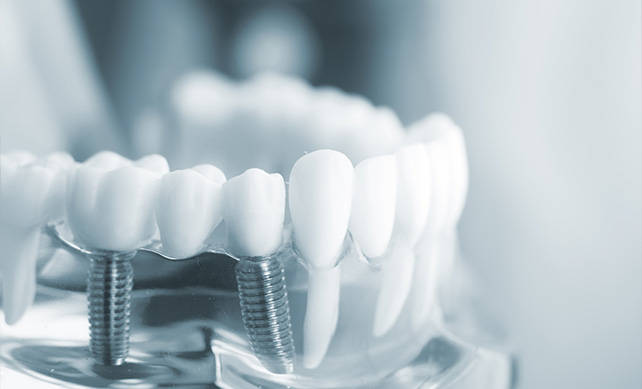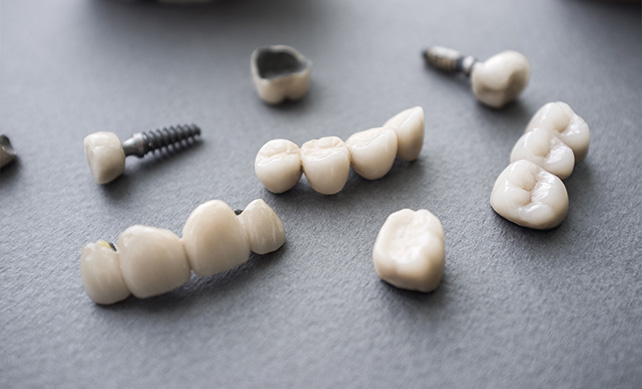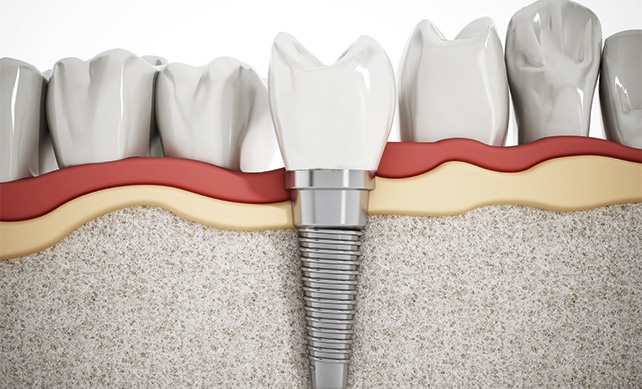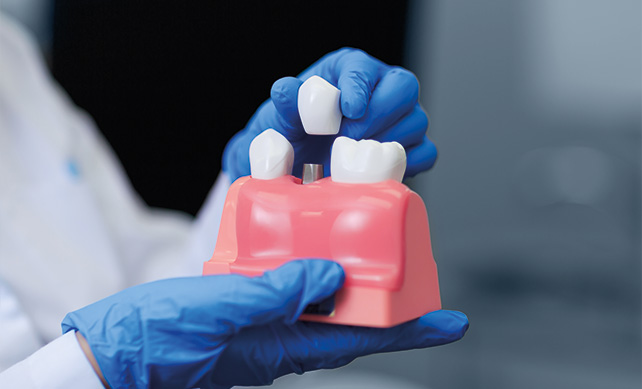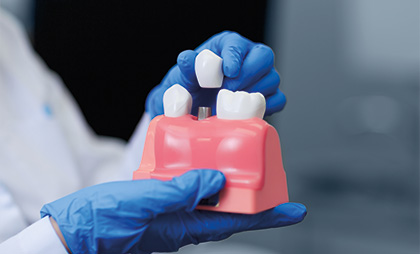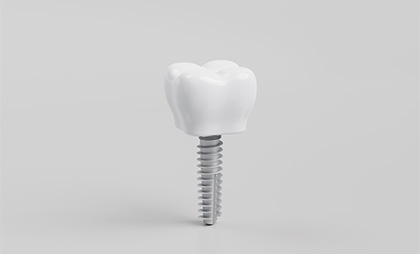Tooth Implant
What Is Tooth Implant Surgery
Tooth implant surgery is placing an artificial tooth root, or a dental implant, into the jawbone to support a prosthetic tooth or bridge. The implant is made of titanium, which is biocompatible. It can fuse with the bone over time, creating a strong and stable foundation for the replacement tooth.
During dental implant surgery, the surgeon makes an incision in the gum tissue to expose the jawbone. Then he drills a small hole in the bone to insert the dental implant. The implant is left to heal and fuse with the bone for several months. Afterward, a permanent restoration like a crown or bridge is attached to the implant. Tooth implant surgery is common and effective. It replaces missing or damaged teeth, giving patients a natural-looking and durable solution. This restores their smile and improves their oral health.
Candidates for Tooth Implant
Dental implant procedures are an excellent option for many patients who have lost one or more teeth due to injury, decay, periodontal disease, or other dental issues. However, not everyone is a good candidate for artificial teeth. Here are some factors that are typically considered when determining whether a patient is a good candidate for tooth implant surgery:
- Good general health: Patients should be in good overall health and free from any long-term health conditions that may interfere with the healing process. Such as uncontrolled diabetes, autoimmune diseases, or certain medications.
- Sufficient bone density: Tooth implants – all types of implants – require a certain amount of bone density to anchor correctly. If a patient has lost too much bone in the jaw, bone grafting may be necessary before placing the implant.
- No active gum disease: Patients should have healthy gums and teeth to support the implant and ensure the success of the implant surgery. A patient with active gum disease must be treated before the implant surgery.
- Non-smokers: Smoking can interfere with the healing process. Therefore, it is recommended that patients who smoke should quit before the implant procedure.
- Patients with missing teeth: Good candidates for tooth implant surgery are patients with missing teeth and looking for a permanent solution.
It is essential to consult with a dentist or oral surgeon to determine if you are a good candidate for tooth implant surgery. They will evaluate your oral and overall health and discuss your treatment options.
Pre-Tooth Implant Instructions
Before tooth implant surgery, your dentist or oral surgeon will give you specific instructions to follow to ensure the best possible outcome. Here are some general pre-tooth implant instructions that may be recommended:
- Stop smoking: Smoking can increase the risk of complications during and after surgery. Therefore, it is recommended that patients stop smoking at least two weeks before the procedure.
- Refrain from alcohol and caffeine: Alcohol and caffeine can interfere with the healing process. Thus, it is recommended that patients avoid these substances for at least 24 hours before the procedure.
- Follow fasting instructions: Dental implants are done under local anesthesia. Therefore, patients are required to fast for a certain period before the procedure to reduce the risk of nausea or vomiting.
- Take prescribed medications: Patients may be prescribed antibiotics or other medications before the procedure to reduce infection risk or manage pain.
It is essential to follow pre-tooth implant instructions carefully. Doing so reduces the risk of complications and ensures the best possible outcome for natural teeth looking. Additionally, your dentist or oral surgeon may provide specific instructions based on your needs, bone loss, and health status.
Stages Of Tooth Implant
The stages of tooth implant typically involve the following steps:
- Initial Consultation: This is where the dentist or oral surgeon evaluates the patient’s dental health and determines if they are a good candidate for dental implants. They will also explain the procedure and answer any patient questions.
- Treatment Plan: Once the patient is deemed a good candidate, a treatment plan will be created that outlines the specific steps of the tooth implant procedure and the timeline for completion.
- Tooth Extraction (if necessary): If the tooth to be replaced is still in the mouth, it may need to be extracted before the implant can be placed.
- Implant Placement: The implant is surgically placed into the jawbone. The surgeon will make a small incision in the gum tissue to expose the jawbone. Then the hole is drilled into the bone where the implant will be placed.
- Osseointegration: This is the process by which the implant fuses with the jawbone over several months, creating a stable foundation for the replacement tooth.
- Abutment Placement: Once osseointegration is complete, a small connector called an abutment is placed on top of the implant. That connects the implant to the replacement tooth.
- Dental Impression: A dental impression is made to create a custom-made replacement tooth. This tooth will fit perfectly in the patient’s mouth.
- Placement of Replacement Tooth: The replacement tooth, or crown, is attached to the abutment, completing the tooth implant process.
- Follow-Up Appointments: The patient will need to return for follow-up appointments to ensure the implant is healing properly and the replacement tooth is functioning as it should.
The tooth implant process is better than the removable denture. It can take several months to complete and requires careful planning, attention to detail, and skill from the dental professional.
Post-Tooth Implant Instructions
After getting a tooth implant, following certain instructions is essential to ensure the best possible outcome. Here are some post-tooth implant instructions:
- Rest: Take it easy for the first few days after the procedure. Avoid any strenuous activity that could increase bleeding or swelling.
- Pain management: It is normal to experience some discomfort after the procedure. You can take painkillers such as ibuprofen or acetaminophen to help manage pain.
- Bleeding: Some bleeding is expected after the procedure. Bite down on a gauze pad over the surgical area to help stop the bleeding. If bleeding continues or becomes heavy, contact your dentist or oral surgeon.
- Swelling: Swelling is also common after the procedure. You can use an ice pack or a bag of frozen peas wrapped in a towel to help reduce swelling. Apply the ice for 10-20 minutes, with intervals.
- Diet: Stick to a soft-food diet for the first few days after the procedure. Avoid hard, crunchy, or chewy foods that could stress the implant area. Also, avoid hot and spicy foods that could irritate the area.
- Oral hygiene: Follow your dentist’s instructions, including using a special mouthwash or avoiding certain dental products.
- Refrain from smoking: Smoking can slow healing and increase the risk of implant failure. It’s best to avoid smoking altogether, but if you smoke, wait at least 48 hours after the procedure before smoking again.
- Follow-up appointments: It’s essential to attend all follow-up appointments with your dentist or oral surgeon to ensure the implant is healing properly and there are no complications.
Following these post-tooth implant instructions can help ensure a smooth recovery and successful outcome.
Before - After Gallery
Take a look at the outstanding results of our previous Cosmetic Dentistry patients, then decide for yourself.
FAQ
How much is a tooth implant?
The cost of a tooth implant can vary depending on a variety of factors, including the location of the dentist, the type of implant, the complexity of the procedure, and the materials used. In the United States, the cost of a single tooth implant can range from $1,000 to $6,000 or more.
What is a tooth implant?
A tooth implant is a prosthetic replacement for a missing tooth. It is made up of a titanium post that is inserted into the jawbone, a connector (abutment) that attaches the post to a replacement tooth, and the replacement tooth itself.
How much do tooth implants cost?
The cost of a tooth implant can vary depending on several factors. In general, a single tooth implant in the United States can cost anywhere from $1,000 to $6,000 or more.
Are tooth implants painful?
The procedure itself is typically done under local anesthesia, so patients should not feel any pain during the surgery. Afterward, patients may experience some discomfort or soreness, but this can usually be managed with over-the-counter pain relievers.
How long does it take to get a tooth implant?
The entire process of getting a tooth implant can take several months, as it involves multiple stages. The first stage involves placing the implant post into the jawbone, which can take anywhere from 30 minutes to an hour. After that, there is a healing period of several months during which the implant fuses with the jawbone. Finally, the replacement tooth is attached to the implant.
What does a tooth implant look like?
A tooth implant is made up of three main parts: the implant post, the abutment, and the replacement tooth. The implant post is a small, screw-shaped piece of titanium that is inserted into the jawbone. The abutment connects the implant post to the replacement tooth, which is typically made of porcelain or another durable material.
Are tooth implants safe?
Tooth implants are generally considered safe and have a high success rate. However, as with any surgical procedure, there are some risks involved, such as infection, implant failure, and nerve damage.
How does a tooth implant work?
A tooth implant works by replacing the root of a missing tooth with a titanium post that is inserted into the jawbone. Over time, the implant fuses with the jawbone in a process called osseointegration. Once the implant has fully fused with the jawbone, a replacement tooth is attached to the implant using an abutment.
How long after tooth extraction can I get an implant?
The timing of getting an implant after tooth extraction can vary depending on several factors, including the location of the extraction site, the condition of the jawbone, and the patient’s overall health. In general, it is recommended to wait at least three to six months after tooth extraction before getting an implant to allow for proper healing of the jawbone.




BLOG & NEWS
BLOG
Which Breast Augmentation Implant Is the Best?
see all

NEWS
TURKEYANA REDEFINING THE CONCEPT OF BEAUTY
see all


















